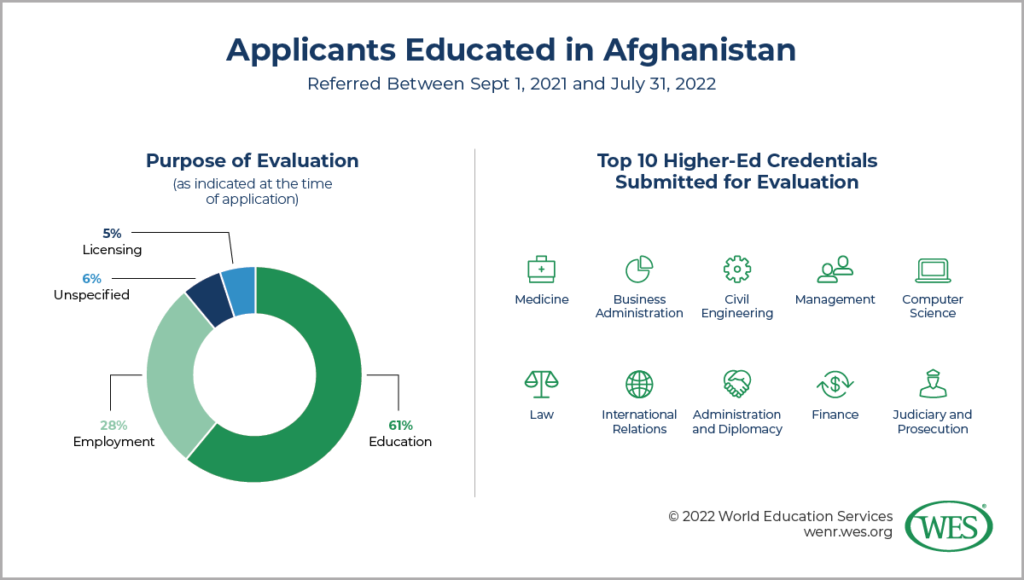 [1]
[1]Huria Sunbol Waheed was afraid she wouldn’t be able to use her previous education, knowledge, and work experience in Canada, but she says that the Gateway Program has provided her with much-needed support.
A little more than a year ago, Huria Sunbol Waheed was busy preparing for her second semester master’s degree exams at Kardan University in Kabul. But in mid-August 2021, she and her family were forced to drop everything and cross the border to Pakistan. They were among the hundreds of thousands of Afghans who fled after the sudden takeover of the country by the Taliban, a group known for its militant suppression of women, civil society, and the free press.
From Pakistan, Waheed’s mother and some of her siblings were able to quickly make their way to Canada. With the support of the Canadian government, Waheed and her sister were able to join them two months later. “I worried about my future,” Waheed admitted. “I was afraid that I would not be able to use my years of hard work on my education to build a new life.”
But Waheed’s fears turned to happiness when she learned about the Gateway Program [2], an initiative of World Education Services (WES) first piloted in 2016 in response to the Syrian refugee crisis. The WES Gateway Program validates and assesses the academic qualifications of refugees and asylum-seekers in the United States and Canada who are countries where deteriorating conditions make it difficult, if not impossible, to obtain proof of academic study. WES Gateway Program assessments can help displaced individuals complete their studies and enter the labour market.
“The Gateway Program provides amazing and much-needed support to people fleeing conflict zones, most of whom, myself included, are well educated and have professional experience,” Waheed said. In Afghanistan, Waheed worked for the World Bank, while her mother had worked for BBC Radio and one of her sisters at the U.S. Embassy. These foreign affiliations would have put them squarely in the crosshairs of the Taliban, endangering their lives.
The Emotional Weight of Starting Anew
The Gateway Program aids refugees and asylum-seekers by validating and assessing their academic qualifications. The program evaluations are accepted by academic institutions, government organizations, and employers across Canada and the U.S..
In addition to Syria, the program accepts applicants who where educated in Afghanistan, Eritrea, Iraq, Turkey, Venezuela, and Ukraine.
According to Beatrice Kohlenberg, associate director of program delivery and integration at WES, people fleeing conflicts or natural disasters are often unable to bring crucial documentation with them. She notes that obtaining these documents later by mail can pose significant safety risks for refugees and their families.
Waheed experienced something similar. “I was more fortunate than others because I was able to bring documents proving my undergraduate studies,” noted Waheed. “But I could not obtain anything related to my master’s studies before leaving.”
Waheed noted that these challenges can be emotionally difficult. “When I arrived here, I was afraid, like many others, that I would lose both my country and all the progress I previously made in building my future,” Waheed said. “Having support from an institution that understands these fears and helps overcome them is invaluable.”
Kohlenberg stressed that the WES Gateway Program was designed to ensure a smooth experience for newcomers and address their complex needs. The program also considers the financial situation of the applicants. Program participants with limited financial resources have access to various supports to cover the cost of the evaluation assistance, which Waheed found immensely helpful.
Partnerships Open Doors
The WES Gateway Program has seen a remarkable increase in the number of applicants from Afghanistan over the past year. The program evaluated 1,192 applications between September 2021 and the end of July 2022, in both Canada and the U.S., mostly from people between 30 and 39 years of age.
Reaching these applicants would have been impossible without the help of local institutions, such as Jumpstart Refugee Talent [4]. Founded in 2016 by former refugees, Jumpstart is a Gateway partner that works to advance the economic integration of refugees and help them enter the Canadian labour market.
“We understand the needs of refugees and seek to help them start building their lives anew,” said Sohaila Khaliqyar, the Gateway Program coordinator at Jumpstart. “Obtaining an accreditation report is a cornerstone for launching into the labour market.” She added that Jumpstart provides advice to refugees and asylum-seekers about all available opportunities, whether for study or work.
Mariam Danishjo heard about Gateway Program through Jumpstart. She graduated in 2011 with a bachelor’s degree from Kabul University. Soon thereafter, deteriorating security and economic conditions in Afghanistan forced her to flee to Turkey. There, she spent eight years and earned a master’s degree before arriving in Canada about a year ago.
“When I arrived, I was only concerned with the question of how I would be able to use my previous studies here. It was all new to me, and I needed help and guidance and got it through Jumpstart Refugee Talent who assured me that I could have my university degrees assessed through WES,” she said. “A WES evaluation report will help me in finding employment right now as well as in my educational career.”
Today, Danishjo is working to improve her command of English legal terminology. She will also need to take some courses and obtain some practical experience before starting her career in Canada. “I’ve always dreamed of being a lawyer. I was really afraid of losing the ability to do it here. But it will come true soon.”
Opening Windows of Opportunity
Labour shortages have worsened in recent months in both the U.S. and Canada. In the U.S., these shortages have led to small but significant changes in federal policy towards refugees. Similarly, Canada has announced that it will welcome roughly 71,000 immigrants and refugees every year from 2022 through 2024. Both countries will seek to leverage the academic achievements and professional expertise of these newcomers to bolster their labour markets.
While these shifts have opened up a small window of opportunity for refugees, they do not guarantee that refugees will end up in the schools or careers of their dreams, noted Heather Webster, career advisor at Global Talent Idaho [5], a Gateway partner.
“We understand that people have had dreams either for a specific degree or job for a long time,” Webster said. “Our role is to help them find those opportunities, but also to guide them towards other opportunities that may meet the needs of the local community. They may be disappointed in the short term, but we always remind them, and ourselves, that there may be alternative solutions in the future.”
Universities can play an important role in guiding and counseling newcomers displaced by conflict. The desire of many refugees and asylum-seekers to complete or further their studies has prompted a number of universities to partner with the Gateway Program.
“Over the past year, we have received a lot of inquiries from Afghans looking for opportunities to continue their education,” said Meghan Walter, director of international admissions at George Mason University in Virginia. “Their main question is, ‘What are our options?’ This prompted us to seek Gateway’s help in finding solutions.”
While the university offers support services, such as English language classes, to these individuals on its own, it also recommends that they request an evaluation through the Gateway Program. Obtaining a Gateway assessment can help them complete a degree or pursue a new one.
Walter acknowledges that this assistance requires extra work for the university’s administrative staff, especially given the growing influx of Ukrainian applicants since the beginning of the year. “We are proud of what we have done so far, but we need additional financial resources and support to do more,” she said.
Partnerships can supply some of that support. “Partnering with other local organizations helps to pool available financial resources as well as share strategies and advice on the best ways to provide assistance,” Khaliqyar said. “It also eliminates duplication of efforts and helps newcomers resume their ‘normal lives’ in the shortest time and with the least stress.”
Like Khaliqyar, both Waheed and Danishjo hope that more organizations partner with Gateway moving forward. “Not many people know about the Gateway Program,” said Waheed. “By partnering with others, you can reach more potential beneficiaries who may be confused about their future and how to take their first steps in a new country.”
WES would certainly welcome these new partnerships. As Beatrice Kohlenberg noted, “At WES, we are humbled by the resilience of the refugees we serve in the Gateway Program and proud to be able to provide a service that plays an essential role in their successful economic and social integration.”

